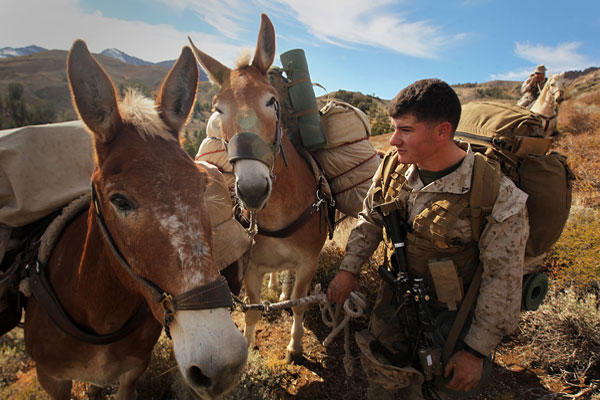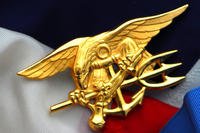When motorized vehicles can't hack it, Marines and soldiers can fall back on what they've learned in the California outback from 32 mules, 13 horses, one donkey and one retired master sergeant.
Going back to the1980s, the Animal Packers Course at the Marine Corps Mountain Warfare Training Center in Bridgeport, Calif., has educated Marines and soldiers in the lost combat art of handling pack animals to get gear in, and get the wounded out, in terrain too difficult for vehicles.
Both Marines and Army troops have had to use pack animals they picked up locally on occasion in Iraq and Afghanistan. Special Operations Forces troops famously rode horses into battle with Northern Alliance allies in Afghanistan at the start of the war in 2001.
In a commencement address to the Air Force Academy in 2006, then-Defense Secretary Donald Rumsfeld told of his astonishment on greeting SOF troops on a Christmas trip to Afghanistan in 2001.
"I visited with a group of Special Operations Forces that were operating in truly remarkable ways," Rumsfeld said. "In preparation for performing a mission the month before, they had asked for the usual supplies, but one item stood out. They asked for horse feed."
The emphasis is on "field expedient packing," said retired Marine Master Sgt. Andrew Parkhurst, director of the course that draws select students from the battalions that come to train in mountain warfare.
"We train animal packers. A lot them don't have any experience with animals," Parkhurst said, and so the introduction to the course can tend to get as elementary as identifying a mule from a horse.
Once the trainees get through the 16 days of the course, including 5- to 7-day treks over mountains and across deserts, they'll have the skills with pack animals that they can pass on to others in their units, Parkhurst said. Trainees can utilize their training with a camel, a llama, a goat or whatever animal is available where they are operating, Parkhurst said.
Staff Sgt. Andrew Balcunas had zero experience with pack animals growing up in Campbell, Calif., in the San Francisco Bay area. He said he took to it after taking the course and now is the non-commissioned officer in charge at the school.
"The first week is hands on experience, how to approach the animal, how to put a halter on the animal" and other skills, Balcunas said. In the packing and arrangement of the panniers (saddlebags), "you've got to make sure you've got equal weight on both sides," Balcunas said.
"Mostly, we use mules," Parkhurst said. "You can pack one-third of a mule's bodyweight. Donkeys don't hold up as well," he said.
Pack animals were used by U.S. troops during World War II and the Korean War, but there is no record of their use in Vietnam, Parkhurst said.
After the CIA supplied thousands of animals to the Afghanistan mujahideen in their fight against the Soviets in the 1980s, "the Marines took a look at it" and started up the Animal Packers Course, Parkhurst said.
In a sense, they were following the tradition of Staff Sgt. Reckless, the chestnut mare who liked scambled eggs, Hershey chocolate bars and beer, and who carried ammunition and the wounded for the Marines under heavy fire in Korea.
To mark the 60th anniversary of the Korean War armistice last month, Marine Corps Commandant Gen. James Amos presided at a ceremony at Semper Fidelis Memorial Park next to the Marine Corps Museum in Quantico, Va., to unveil a statue of Reckless.
The Corps bought Reckless for $250 from a Korean boy in 1952. In 1953, while with troops of the 5th Marine Regiment, 1st Marine Division, Reckless was credited with making 51 trips carrying ammunition and the wounded at the battle of Vegas Hill. She was wounded twice.
The example of Reckless has inspired the Corps to maintain skills in handling animals.
"We still think it's a viable option" in warfare, Parkhurst said. "We've had to pack animals on and off over the years. If you can take a pound off a Marine's back, he's that much better off."


























